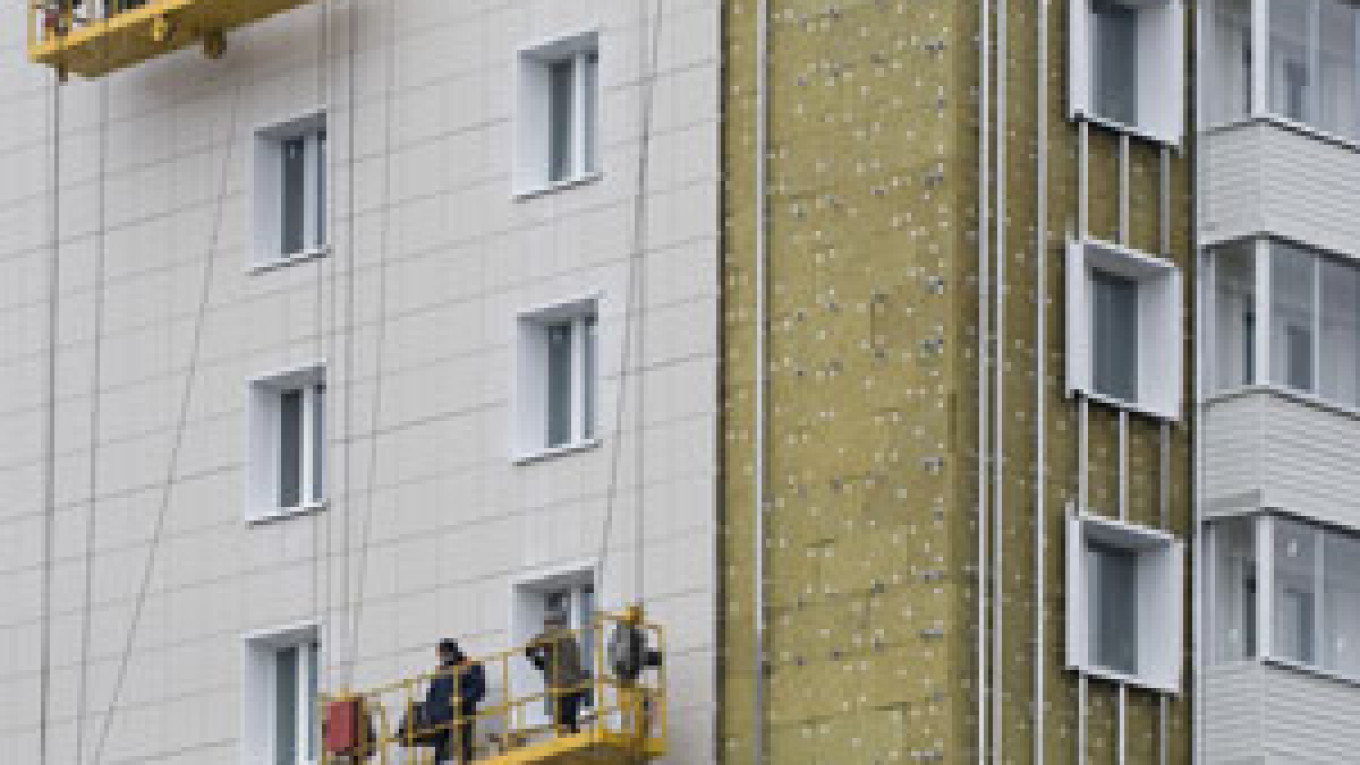Cheaper money and easier lending terms are likely to bring consumers back to the mortgage market, but it may take a couple of years for borrowers to leave the lessons of the crisis behind them.
Last week, state-owned lenders Sberbank and VTB-24, which together account for more than 60 percent of the mortgage market, decided to cut the required mortgage down payment to 10 percent, lowering one of the biggest barriers for prospective homeowners.
A stabilized lending market has allowed some banks to loosen mortgage lending terms, although some risks remain, said Anton Goltsman, a spokesman for VTB-24.
So far, the 10 percent figure marks the lowest down payment on the market, with most private lenders requiring about 20 percent upfront.
Typical borrowers often have the cash equivalent of 15 percent to 20 percent of the housing price, so a 10 percent down payment would expand access to many more potential homebuyers, said Marina Melkonyan, head of the private and corporate lending department with Penny Lane Realty.
But borrowers today are likely to hesitate before massively increasing their debt load, especially with the experience of the financial crisis fresh in their minds, Melkonyan said.
"It's hard for people to take on new debt obligations, not only from the financial point of view but from the psychological one as well," she said.
Therefore, a complete rebound in mortgage lending may take some time, as it will take a year or two for consumers to recover enough financially and psychologically to take out new mortgages, she said.
Nevertheless, mortgage lending this year is set to outstrip 2009's dismal totals. A total of 76.3 billion rubles in mortgages have been extended in the first four months of 2010, compared with 2009's full-year total of 152.5 billion rubles, the Mortgage Lending Agency said in a report.
By the end of the year, as much as 320 billion rubles may be lent out for housing, the report said.
Mortgage interest rates have been becoming more affordable for consumers as well, driven down by a looser monetary policy from the Central Bank, as well as pressure from senior government officials.
The average rate for ruble denominated mortgages stood at 13.5 percent in May, down from a crisis-time peak of 14.6 percent, according to Central Bank data. The Central Bank's key refinancing rate was cut to 7.75 percent at the beginning of June, an all-time low and down significantly from the 12.5 percent the bank charged credit organizations to borrow money in May 2009.
The country's ruling tandem has made no secret of where it would like mortgage rates to go.
President Dmitry Medvedev said Friday that banks ought to continue lowering mortgage rates, as a low refinancing rate gives them excessively large profit margins.
"Of course, banks are fat cats. They earn more than small and medium-sized businesses, but they are not isolated from the world situation," he said at a meeting with representatives of small and medium-sized businesses in Birobidzhan, in the Jewish Autonomous Region.
Prime Minister Vladimir Putin has called for mortgage rates to be no higher than 11 percent, and has ordered Vneshekonombank to invest as much as 20 percent of the Pension Fund into mortgage bonds, with the aim of bringing down interest rates.
The average interest rate for ruble mortgages may fall to 12 percent, the 2008 level, by the end of the year, Alexander Semenyaka, head of the Mortgage Lending Agency, said Thursday.
But at the same time, risks for banks have grown. The share of overdue mortgage payments has been steadily growing since the onset of the crisis. As of May, a total of 3.4 percent of all mortgage loans were behind on payments, up from 1.1 percent at the beginning of 2009, according to Central Bank data.
And as down payments are lowered and interest rates fall, banks may find other ways to limit their risk, Melkonyan said.
VTB-24, for example, is requiring a one-time upfront payment of 2 percent of the loan value to serve as insurance on the debt.
A Message from The Moscow Times:
Dear readers,
We are facing unprecedented challenges. Russia's Prosecutor General's Office has designated The Moscow Times as an "undesirable" organization, criminalizing our work and putting our staff at risk of prosecution. This follows our earlier unjust labeling as a "foreign agent."
These actions are direct attempts to silence independent journalism in Russia. The authorities claim our work "discredits the decisions of the Russian leadership." We see things differently: we strive to provide accurate, unbiased reporting on Russia.
We, the journalists of The Moscow Times, refuse to be silenced. But to continue our work, we need your help.
Your support, no matter how small, makes a world of difference. If you can, please support us monthly starting from just $2. It's quick to set up, and every contribution makes a significant impact.
By supporting The Moscow Times, you're defending open, independent journalism in the face of repression. Thank you for standing with us.
Remind me later.


